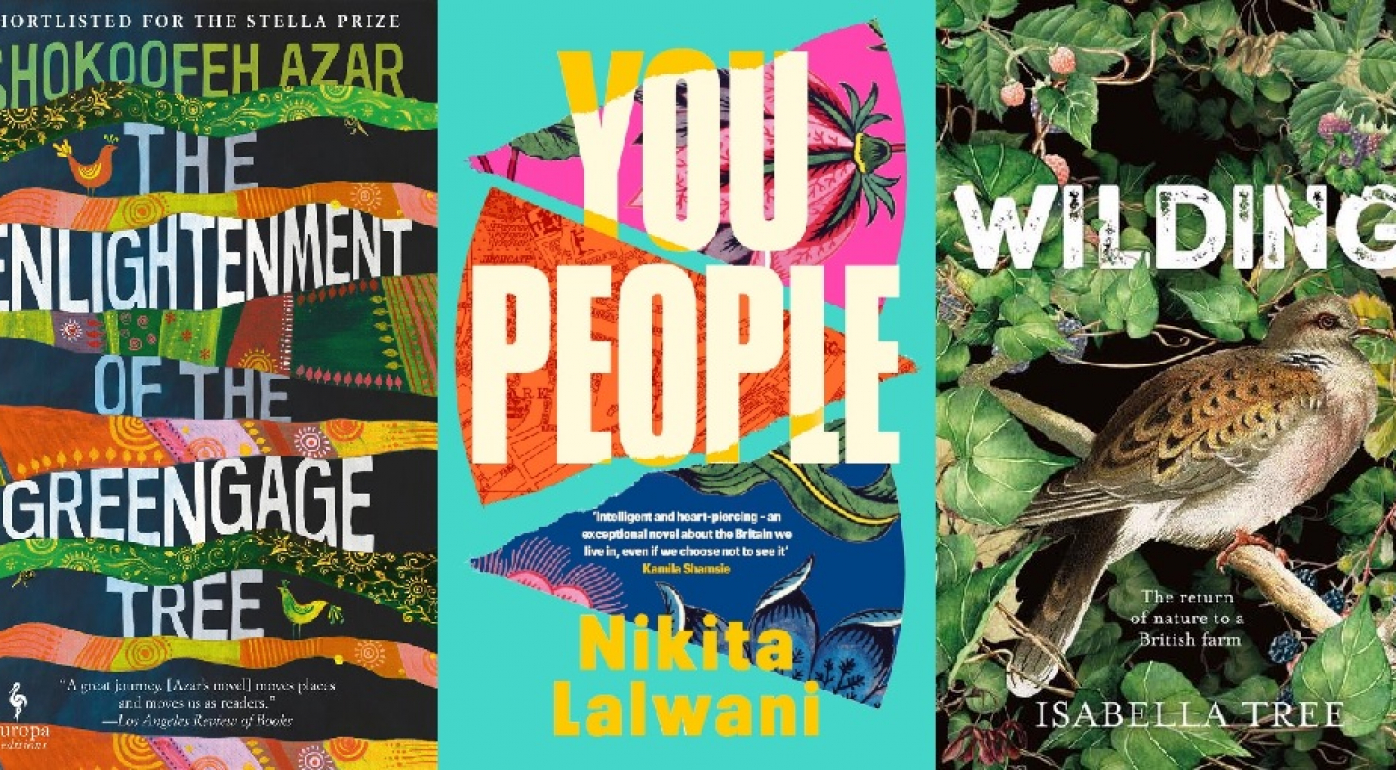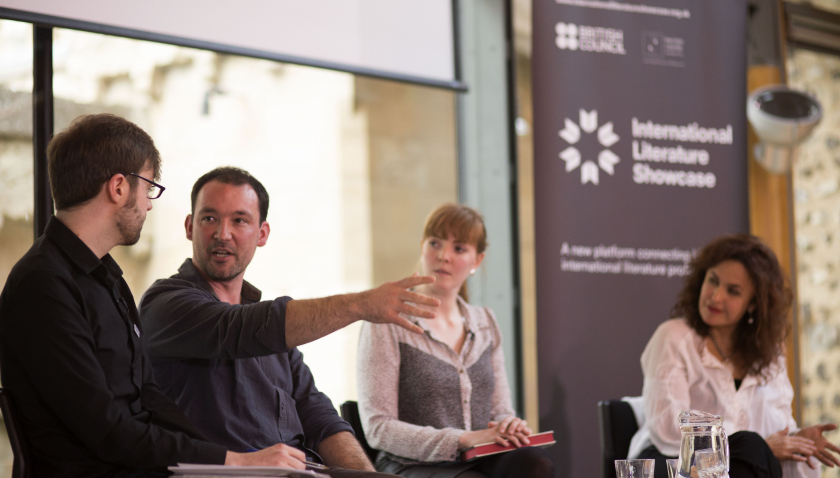Whether delving into chunky historical narratives or listening to short story podcasts, we’ve all been approaching reading differently during lockdown. Our reading habits can take us back in time, allow us to examine our present, or give us hope for the future. In time for the May bank holiday weekend, the Literature team shares what they’ve been reading lately.
You People by Nikita Lalwani
Nikita Lalwani's You People follows Nia, a 19-year-old British-Indian girl, and Shan, a Tamil refugee, who work at a London pizzeria and are both in thrall – in different ways – to the restaurant's enigmatic manager Tuli. Initially, Nia and Shan don't have much in common, and their differing views of Tuli reflect this. Nia wants to escape her troubled family, while Shan longs to bring his wife and child to the UK; Nia, having been sent down from Oxford, wants to escape the bonds of the establishment, while Shan longs for Britain's elite to grant him indefinite leave to remain. To Nia, Tuli is mercurial and charming, glimpsed offering deals and generous loans; from Shan's perspective, he's to be courted and obeyed, able to use his influence and wealth to bring Shan's family to safety.
Things change when Nia voluntarily enters a world that Shan can’t escape, and You People uses a gripping, thriller-like structure to reflect this. But even as the jaws of the trap close around them, and the protagonists rely on quick thinking and deduction to survive, the novel creates a larger tension from the questions it raises about responsibility and privilege. The novel works like a moral maze, one in which the reader must repeatedly rethink their positions on themselves, and the society around them, as they go.
Swithun Cooper, Research and Information Manager Literature
The New Yorker Fiction Podcasts
Like many people, I’ve been struggling to read during lockdown – despite having more time than ever to get through my pile of unread books, I find myself unable to concentrate or focus on anything other than the current situation. And so, I have been turning to short stories, in collections, anthologies, online, and in podcasts. In particular, The New Yorker’s Fiction Podcast and its sister, The Writer’s Voice, have been keeping me company during my daily piece of exercise. The latter showcases a writer from a current issue of the magazine reading their short story, while the former features a writer reading a short story from the New Yorker’s vast archives, then discussing it with Fiction editor Deborah Treisman. Favourites of mine include Sarah Shun-lien Bynum reading Yiyun Li’s “Extra”, Chimamanda Ngozi Adichie reading Jamaica Kincaid (she also read an early version of Kincaid’s Annie John on the short-lived Guardian short story podcast, which is fantastic if you can track it down), Anne Enright reading “Night Swim” on The Writer’s Voice, and Karen Russell reading her short story “The Bog Girl”. If, like me, short stories are a favourite genre, you’ll enjoy a deep dive into writing from masters of this form both past and present, from Dorothy Parker and Mavis Gallant to Edwidge Danticat and Tessa Hadley.
Rose Green, Literature Programme Coordinator
The Enlightenment of the Greengage Tree by Shokoofeh Azar, tr. anonymous
I’m taking the opportunity to read through the excellent shortlist for the International Booker Prize. My book this week was The Enlightenment of the Greengage Tree by Shokoofeh Azar, which is her first novel to be translated from the Persian original. Set in Iran following the 1971 Islamic Revolution, the book tells the story of a young girl whose family flee their home in Tehran and set up in a small village in the country, with the hope of preserving some of their existing freedoms. It’s a playful novel, which weaves in aspects of magical realism and storytelling against a backdrop of politics, religion, love, and oppression. A very engaging read, and very skilfully translated.
Rachel Stevens, Director Literature
Wilding by Isabella Tree
We’re all looking at nature a bit more closely these days, whether from the window or during the daily walk. I read – or rather gobbled down – Wilding by Isabella Tree, the story of encouraging nature to take over a (large) patch of formerly intensively farmed land in West Sussex. It’s a remarkable book, not only because it kept me gripped through detailed explanation of soil composition but also because it’s clear that we have the answers to the climate change and associated crises already in our grasp. The speed with which rare and endangered species race to the Knepp Estate, how the water quality clears, how the pigs grub up the soil and encourage beetles, how turtledoves come and sing from the trees, makes it clear to me how interconnected we all are and how much we have taken for granted the extraordinary ordinary processes of the world. With the news that developing zoonotic viruses like the coronavirus come from human action interfering with animal habitat, it’s a good time for us all to think about the way we have allowed the world to be treated, and perhaps start to behave towards nature as one might do towards the literal source of life. This book points the way towards a better future and I can’t recommend it highly enough.
Harriet Williams, Literature Programme Manager
The Lost Words by Robert Macfarlane and Jackie Morris
Since outdoor time is precious at the moment, we have been reliving our walks through Robert Macfarlane and Jackie Morris’ The Lost Words. This is a beautifully illustrated anthology of the nature words not included the last edition of the Oxford Junior Dictionary. My son enjoys trying to read the words and looking for the puzzles and patterns in the pages – things only children would notice. We talk about the things we’ve seen (the more pedestrian ferns, brambles and dandelions) but will now be hoping for a glimpse of a weasel or kingfisher on our walks.
Rebecca Hart, Literature Programme Manager
The Mirror and the Light by Hilary Mantel
I have long been awaiting the launch of Hilary Mantel’s The Mirror and the Light, the concluding part of her trilogy which tells the fictionalised story of the life of Thomas Cromwell and his service to King Henry VIII. With the first two books having won the Man Booker prize, my expectations were high. Lockdown proved the perfect time to tackle this 900-page book (much easier to read in my armchair than on my commute!), and I found myself fully immersed in Tudor England, which was brought to life so vividly that I spent the couple of days after I finished reading it in expectation of a queen and her attendants sweeping into the room, and shuddering in recollection of the punishments meted out in the Tower of London. There were some parts which felt strangely familiar – the references to sheltering inside to avoid the plague were particularly resonant – but this is so much more than a rich historical narrative. It is also a complex psychological study of a man, as well as an exploration of power, class, religion, and politics – national and international. The Mirror and the Light truly exceeded my expectations; it is a vast, powerful and timeless book.
Sinead Russell, Director Literature


